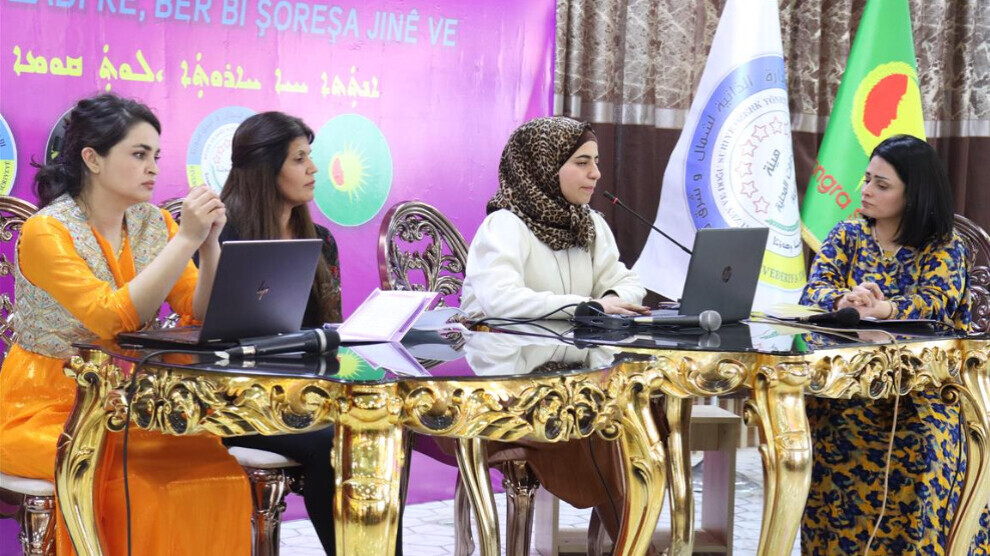Bêrîvan Yûnis: I have torn the curtain of fear in my life with the Rojava Revolution
Bêrîvan Yûnis has torn the curtain of fear in her life by believing in the revolution in North and East Syria. “Following the revolution, women built a new life in the march for freedom,” she said.

SORGUL ŞÊXO
Qamishlo- Women, who fought on the frontline of the Rojava Revolution on July 19, 2011, have become a role model for millions. In an interview with NuJINHA, 32-year-old Bêrîvan Yûnis, who lives in the Amûdê town of Cizîrê Region’s Qamislo Canton, talked about the revolution and the resistance of women.
When the revolution started, Bêrîvan Yûnis first went to the Kurdish Language Institute (SZK), which first began Kurdish education in private homes in North and East Syria. “Then, I became the mayor. I also served as co-chair of tourism. Now, I am a presenter at JIN TV, a member of Jineoloji Research Center, a journalist, a member of the Legislative Assembly and Kongra Star in Cizîrê.”
‘Women have become more awareness after the revolution’
Bêrîvan Yûnis thinks that women are given more value thanks to the revolution. Pointing out the tribes, customs and traditions leading oppression and barriers against women, she said that women have become more aware after the revolution. “I can say that women have changed and developed thanks to the thoughts of leader Abdullah Öcalan. Women are oppressed due to social customs and traditions. We did not accept to be a classical woman. I did not accept to have such a life and the institution of marriage.”
‘We participated in the works for education in mother tongue as a family’
When the fight for freedom started, Bêrîvan Yûnis decided to take part in this fight. “I had big dreams but I did not know that I would be such a woman and that my personality would change. The universities in Syria were closed down due to the Syrian crisis and what would be in the Kurdish regions was unknown. I believe that this revolution is a language revolution. When the revolution started, I first went to the Kurdish Language Institute (SZK). We participated in the works for education in our mother tongue as a family. A new part started in my life.”
‘I have torn the curtain of fear in my life with the Rojava Revolution’
“There is a big difference between women in the past and now,” Bêrîvan Yûnis said, “During a revolution, you are yourself. You represent yourself and decide who you are and what is good for you. Being yourself means 'No' to what is unacceptable. I have torn the curtain of fear in my life by believing in the revolution.” Emphasizing that it is not easy to overcome the codes written in their consciousness, Bêrîvan Yûnis said, “At the beginning, it was very difficult; however, women built a new life in the march for freedom following the revolution. Now, we say; if you exist, I also exist.”
‘The patriarchal mentality determined the fate of women’
Speaking about the borders drawn by society against women, she said, “Now, women have proven themselves in society. Before, the patriarchal mentality determined the fate of women. But now, women determine their own fate.” Pointing out that the revolution has led to a change and transformation in society, she added, “As Kurdish women, we fought on the frontline for freedom and then women from different nations joined us. The women leading the ‘Jin, Jiyan, Azadi’ uprising in Eastern Kurdistan and Iran got their strength from the women leading the revolution in Rojava. After the revolution in Rojava, the women of the Middle East and the world came together and expressed their opinions and stances. The slogan of ‘Jin, Jiyan, Azadi’ is now a global slogan thanks to thousands of women. Now, we hold all conferences, workshops and seminars in Kurdish. Women have now become the power of the solution and have shown that they can live together without any state.”
Speaking about the system in North and East Syria, she said, “It is a project showing that women's freedom is the freedom of society and that women and men can live together equally. In our system, women and men are equal; there is no difference between them. In North and East Syria, women participate in politics thanks to the co-presidential system. We know that the unity of women is the best response to all kinds of attacks. Now, North and East Syrian women share their experiences with the women of Eastern Kurdistan, Iran, Tunisia and Afghanistan. Women will fight until they achieve their freedom and build a democratic system.”
